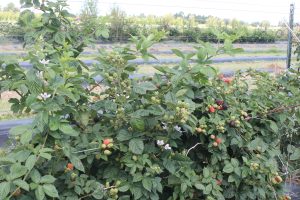Blackberries are already known for their health benefits, and someday, they might provide even more antioxidants than the ones you buy now, say University of Florida researchers.
UF/IFAS researchers are trying to breed and grow blackberries, which ripen in April, May and June in the Sunshine State. In a new study, scientists found metabolites that may boost antioxidant contents and anti-inflammatory properties of the berries.
In the study, Yu Wang led a team that compared the metabolite profiles of six blackberry varieties.
Among them, ‘Kiowa’ showed the highest ability to protect cells from damage and fight inflammation.

“This work could provide a perspective on potential health benefits of consuming blackberries,” said Wang, an associate professor of food science and human nutrition at the UF/IFAS Citrus Research and Education Center. “This study deepens our understanding of the molecular mechanisms contributing to the health benefits of blackberries.”
‘Kiowa’ grows well and produces large berries but has many thorns. It does not grow commercially in Florida. Zhanao Deng, a UF/IFAS professor of environmental horticulture, has been breeding and trying to grow blackberries at the Gulf Coast Research and Education Center since 2015.
In the United States, the major blackberry producing states include Oregon, California, and Washington on the west coast, and Georgia, Texas and North Carolina in the east and south.
They’re an emerging crop in the Sunshine State.
About 130 acres of the fruit are commercially produced in the Mayo area of North Florida and in Plant City and Parrish in the Tampa Bay region, Deng said.
Blackberry cultivars on commercial farms include ‘Osage,’ ‘Ouachita,’ ‘Ponca,’ ‘Prime-Ark Freedom’ and ‘Prime-Ark Traveler.’ Now, Deng envisions adding ‘Kiowa’ to his toolkit as he breeds blackberries for Florida growers.
“’Kiowa’ was developed by James Moore and John Clark at the University of Arkansas in the 1990s,” Deng said. “We grow them in blackberry field trials, but it’s not grown commercially in Florida because it’s thorny. Since it has the highest levels of antioxidants, we are using this cultivar as a parent in breeding to develop new thornless cultivars with high antioxidant contents as well as high yields and flavorful berries.”
###
ABOUT UF/IFAS
The mission of the University of Florida Institute of Food and Agricultural Sciences (UF/IFAS) is to develop knowledge relevant to agricultural, human and natural resources and to make that knowledge available to sustain and enhance the quality of human life. With more than a dozen research facilities, 67 county Extension offices, and award-winning students and faculty in the UF College of Agricultural and Life Sciences, UF/IFAS brings science-based solutions to the state’s agricultural and natural resources industries, and all Florida residents.
WHY FOOD IS OUR MIDDLE NAME
Feeding a hungry world takes effort. Nearly everything we do comes back to food: from growing it and getting it to consumers, to conserving natural resources and supporting agricultural efforts. Explore all the reasons why at ifas.ufl.edu/food or follow #FoodIsOurMiddleName.
 4
4
